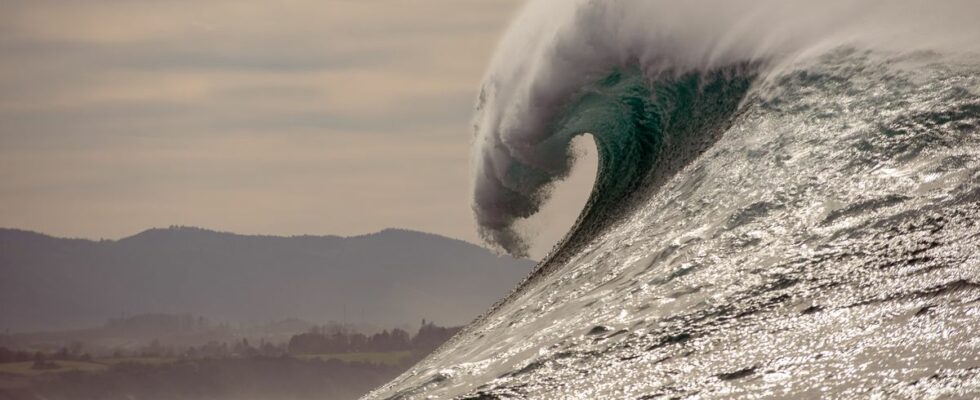“This is not a normal wave. When it gets to the slab of rocks, it sucks up all the water and it doubles in size. It rises suddenly, at full speed”. Imagine that these words spoken by the Breton bodyboarder Yann Salaün about the monstrous wave Annaëlle belong only to the past. Imagine that the secret wave of northern Finistère disappears because man has modified its environment by building a dyke, a port or even a wind farm at sea. Imagine that the same fate is reserved for Teahupoo (Tahiti), Nazaré (Portugal ) to Jaws (Hawaii) or any other mythical waves on this Earth. Revered by all lovers of sliding, these undulations of the ocean undoubtedly deserve to be protected so as not to be erased. Often considered as an infinite source of energy, the swell is also the source of pleasure for tens of thousands of surfers, bodyboarders and skimboarders in France. On the occasion of the French surfing championships which open in Biarritz from October 28 to November 5, 20 minutes was interested in “wave reserves”, the first of which was opened in Quiberon (Morbihan) this year.
Brittany was not selected to host the surfing events of the Paris 2024 Olympic Games, which will take place in Tahiti. But the peninsula was able to stand out by hosting the first “wave reserve”. Voted on by the municipal council of Saint-Pierre-Quiberon at the start of 2022, this decision owes a lot to the commitment of Erwan Simon. “In Brittany, people love their coastline. They are used to walking there, to going to see the waves even if they have never surfed. The subject quickly got people talking. This Morbihan surfer created France Hydrodiversity Association with two friends to carry his fight and succeeded in convincing the municipality of Morbihan to commit not to modify the environment which could affect the waves. “The concept of hydrodiversity didn’t really exist. Yet it is fundamental. A wave is not just a play area for surfers. It is an area of biodiversity, a very special environment that is important to protect”. The Breton surfer draws a parallel with the mountains and winter sports. “If we remove the snow, we have no more skis. But above all, we lose a whole fauna and flora”.
Started in Quiberon, Erwan Simon’s fight will not stop at the wild coast alone. The media coverage of his initiative even propelled him to the rank of referent on the issue, encouraging other associations to look into it. Rémi Moreau had applied for the Basque Country to create a surfing reserve with the blessing of the NGO Save the waves. Failed, the file of the Surfrider Foundation volunteer is not buried. “Surfing brings people together, it allows us to reach people and make them aware of the issue of the marine environment. By protecting a wave, we are not just interested in its physical structure, we also want to preserve its ecosystem, the quality of the water,” explains the man who has been surfing for about five years.
A sand extraction “could have changed everything”
If the resin board has been attracting new followers for a few years, it also has old faithful who have seen certain myths die. In Anglet, the one called La Barre disappeared about sixty years ago when a dyke was erected. In Spain, the Mundaka had also lost all its charm and power when the bay had been dredged to facilitate the passage of cargo ships about fifteen years ago.
“The wave reserve is not a magic tool. But it should allow us to exchange upstream with the communities, to discuss the impact, ”explains Rémi Moreau. In the Basque Country, it is currently difficult to convince municipalities to get involved, in particular because the coast is more urbanized than the wild peninsula of Quiberon. Even classified as a Natura 2000 zone, the territory has already been threatened. “A few years ago, a sand extraction project was mentioned in the sector. It is typically this kind of activity that can change everything,” says Erwan Simon.
The Breton surfer was recently contacted by the promoter of a floating wind project planned between Belle-Ile and Groix. “We will surely be told that it will not change anything. But we have to discuss it, evaluate it”. Erwan Simon dreams of France following in the footsteps of Peru, which has enshrined the protection of waves in its law, or Polynesia, which worships them. “In Europe, we sometimes tend to see the waves as enemies of fishermen, sailors, swimmers. We built dykes to protect ourselves from them, without thinking about the role they had”. A first reserve has been created. Chances are it won’t be the last. As in the ocean, politics often works in series.

